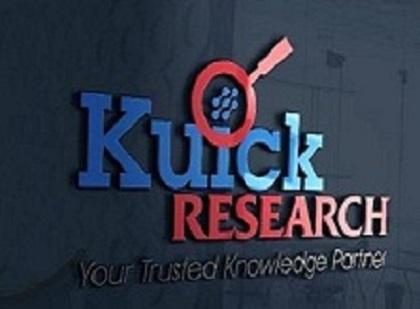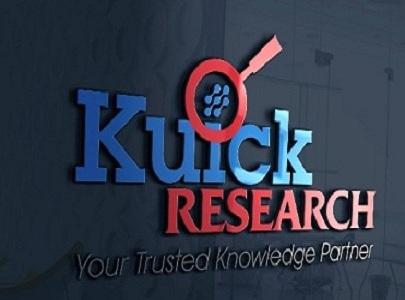Press release
Multivalent Antibodies: Multiple Targets, Enhanced Efficacy
The advent of multivalent antibodies has revolutionized the landscape of targeted therapeutics, offering the ability to engage multiple targets simultaneously and thus enhancing therapeutic efficacy. These innovative molecules are engineered to bind to several antigens or epitopes, providing a comprehensive approach to treatment that addresses the complexity and heterogeneity of various diseases, particularly cancer.Download Bispecific, Trispecific and Tetraspecific Antibodies Report:
https://www.kuickresearch.com/ccformF.php?t=1721642510
One of the primary benefits of multivalent antibodies is their ability to target multiple antigens on different cell populations within a tumor. Cancer is characterized by its heterogeneity, with different cells expressing a variety of antigens. Traditional monoclonal antibodies, which target a single antigen, often fall short in completely eradicating tumors, as they may leave behind cells that do not express the targeted antigen. This can lead to treatment resistance and relapse. Multivalent antibodies, however, can bind to multiple antigens simultaneously, ensuring a broader and more effective attack on the tumor, thereby reducing the likelihood of resistance and relapse.
Multivalent antibodies are designed using advanced protein engineering techniques to achieve high specificity and potency. Bispecific antibodies, a prominent class of multivalent antibodies, possess two distinct antigen-binding sites. This allows them to simultaneously engage two different antigens, enhancing the immune system's ability to recognize and destroy cancer cells. For example, bispecific T-cell engagers (BiTEs) have been developed to link a tumor-associated antigen on cancer cells with a T-cell receptor on immune cells, bringing the T cells directly to the tumor site and boosting their cytotoxic activity.
The clinical success of bispecific antibodies like blinatumomab, which targets CD19 on B-cell malignancies and CD3 on T cells, highlights the potential of multivalent antibodies in cancer therapy. Blinatumomab's ability to redirect T cells to attack cancer cells has led to significant improvements in patient outcomes, particularly in acute lymphoblastic leukemia (ALL). This dual-targeting approach exemplifies how engaging multiple targets can enhance therapeutic efficacy and provide new hope for patients with refractory or relapsed cancers.
Beyond bispecific antibodies, trispecific and higher-order multivalent antibodies are being developed to further enhance therapeutic potency. These advanced molecules can bind to three or more antigens, providing an even more comprehensive approach to treatment. By targeting multiple pathways or cell populations simultaneously, trispecific antibodies can deliver a more potent therapeutic effect, potentially leading to better clinical outcomes.
Multivalent antibodies also hold promise in treating other complex diseases beyond cancer. In infectious diseases, they can be designed to neutralize multiple strains of a virus, offering broad-spectrum protection and reducing the likelihood of viral escape mutants. This capability is particularly valuable in managing rapidly mutating viruses like HIV and influenza. In autoimmune disorders, multivalent antibodies can target multiple pathogenic pathways, providing a more comprehensive suppression of the autoimmune response and potentially leading to longer-lasting remissions.
The development and optimization of multivalent antibodies involve cutting-edge technologies such as bioinformatics, high-throughput screening, and artificial intelligence (AI). These tools enable the precise design of antibody structures, ensuring high efficacy and minimal side effects. AI and machine learning algorithms can predict optimal antibody configurations and identify potential challenges, accelerating the development process and enhancing the therapeutic potential of multivalent antibodies.
Despite their promising potential, several challenges must be addressed to fully realize the benefits of multivalent antibodies. Manufacturing complexity, potential immunogenicity, and regulatory hurdles are significant issues that need to be carefully managed. The production of multivalent antibodies requires sophisticated techniques to ensure consistency and quality, while potential immune reactions must be mitigated to avoid adverse effects. Additionally, navigating the regulatory landscape to obtain approval for these advanced therapeutics involves rigorous testing and validation.
In conclusion, multivalent antibodies represent a transformative advancement in targeted therapeutics, offering the ability to engage multiple targets simultaneously and thus enhancing therapeutic efficacy. By addressing the complexity and heterogeneity of diseases, particularly cancer, these innovative molecules provide a powerful tool for improving treatment outcomes. As research and development continue to advance, multivalent antibodies are poised to become a critical component of next-generation therapies, offering new hope for patients and driving significant growth in the field of targeted therapeutics.
KuicK Research
Delhi
India
Kuick Research is a market research and analytics company that provides targeted information for critical decisions at business, product and service levels. We are quick, predictive and known by the recommendations we have made in the past. Our result-oriented research methodology offers understanding of multiple issues in a short period of time and gives us the capability to keep you full with loads of practical ideas. By translating research answers into strategic insight and direction, we not only rate the success potential of your products and/or services, but also help you identify the opportunities for growth in new demographies and find ways to beat competition.
This release was published on openPR.
Permanent link to this press release:
Copy
Please set a link in the press area of your homepage to this press release on openPR. openPR disclaims liability for any content contained in this release.
You can edit or delete your press release Multivalent Antibodies: Multiple Targets, Enhanced Efficacy here
News-ID: 3596688 • Views: …
More Releases from KuicK Research

Multispecific Antibodies Clinical Trials By Indication Country Company Drug Clas …
Global Multispecific Antibodies Market, Drug Sales, Dosage, Price and Clinical Trials Insight 2030 Report Highlights:
• Global Multispecific Antibodies Market Opportunity By 2030: > USD 50 Billion
• Global Multispecific Antibodies Market Sales In 2024: > USD 12 Billion
• Number Of Approved Multispecific Antibodies: 18
• Global and Regional Trends Insight
• Approved Antibodies Global, Regional, Annual and Quarterly Sales Insight
• Approved Antibodies Dosage and Pricing Insight
• Comprehensive Insight On All Antibodies In Clinical…

Gamma Delta T Cell Cancer Therapy Market Opportunity Clinical Trials Technology …
Global Gamma Delta T Cell Cancer Therapy Market Opportunity and Clinical Trials Insight 2030 Report Conclusions:
• Number Of Gamma Delta T Cell Therapies In Trials: > 30 Therapies
• US & China Dominating Clinical Trials Landscape: > 20 Therapies
• Global Gamma Delta T Cell Therapy Clinical Trials Insight By Company, Country, Indication and Phase
• Gamma Delta T Cell Therapy Future Market Opportunity By Different Cancers
• Insight On Clinical Platforms for Evolving…

US Orphan Drugs Market Sales Clinical Trials Insight 2030
US Orphan Designated Drugs Market Opportunity, Drugs Sales, Price, Dosage and Clinical Trials Insight 2030 Report Offering and Highlights:
• US Orphan Designated Drugs Market Opportunity: > US$ 190 Billion By 2030
• Insight On FDA Designated Orphan Drugs In Clinical Trials: > 850 Orphan Drugs
• Clinical Trials Insight By Company, Indication, Phase and Priority Status
• Insight On FDA Designated Marketed Orphan Drugs: > 500 Orphan Drugs
• Pricing and Dosage Insight: > 400 Marketed Orphan Drugs
• US, Global,…

US Orphan Drug Market Size Forecast 20230
US Orphan Designated Drugs Market Opportunity, Drugs Sales, Price, Dosage and Clinical Trials Insight 2030 Report Offering and Highlights:
• US Orphan Designated Drugs Market Opportunity: > US$ 190 Billion By 2030
• Insight On FDA Designated Orphan Drugs In Clinical Trials: > 850 Orphan Drugs
• Clinical Trials Insight By Company, Indication, Phase and Priority Status
• Insight On FDA Designated Marketed Orphan Drugs: > 500 Orphan Drugs
• Pricing and Dosage Insight: >…
More Releases for Multivalent
Rising Infectious Disease Incidences Drive Growth In The Multivalent Vaccine Mar …
The Multivalent Vaccines Market Report by The Business Research Company delivers a detailed market assessment, covering size projections from 2025 to 2034. This report explores crucial market trends, major drivers and market segmentation by [key segment categories].
What Is the Current Multivalent Vaccines Market Size and Its Estimated Growth Rate?
The multivalent vaccines market size will grow from $8.37 billion in 2024 to $9.2 billion in 2025, at a CAGR of 10.0%.…
Multivalent Antibody Market: Future Growth Outlook
The market for multivalent antibodies is poised for significant growth, driven by the increasing demand for advanced therapeutic options that offer enhanced efficacy and specificity. These innovative antibodies, capable of binding multiple antigens or epitopes simultaneously, address the complexities and heterogeneity of diseases, particularly cancer, infectious diseases, and autoimmune disorders. The future growth of the multivalent antibody market is supported by ongoing advancements in biotechnology, rising investments in research and…
Multivalent Antibodies as Combinational Therapy Approach
The development of multivalent antibodies has introduced a transformative approach in the field of combinational therapies. These innovative antibodies, capable of binding to multiple antigens or epitopes simultaneously, offer a sophisticated strategy to enhance the efficacy and specificity of treatments. The use of multivalent antibodies as combinational therapy is particularly promising in addressing the complexity of diseases such as cancer, infectious diseases, and autoimmune disorders.
Download Bispecific, Trispecific and Tetraspecific Antibodies…
Engineering Multivalent Antibodies for Specificity and Potency
The engineering of multivalent antibodies represents a cutting-edge approach in the development of highly specific and potent therapeutics. These antibodies, designed to bind multiple antigens or epitopes simultaneously, offer significant advantages over traditional monoclonal antibodies, providing enhanced efficacy and reducing the likelihood of resistance. The focus on specificity and potency in multivalent antibody design opens new avenues for treating complex diseases, particularly in oncology, infectious diseases, and autoimmune disorders.
Download Bispecific,…
Multivalent Antibodies as Immunotherapy Approach
The emergence of multivalent antibodies marks a significant milestone in the field of immunotherapy, offering novel ways to enhance the specificity and efficacy of treatments. These antibodies, capable of interacting with multiple antigens or epitopes simultaneously, provide a robust strategy for tackling diseases that exhibit complexity and resistance to conventional therapies.
Download Bispecific, Trispecific and Tetraspecific Antibodies Report:
https://www.kuickresearch.com/ccformF.php?t=1721642510
Multivalent antibodies have shown exceptional promise in cancer immunotherapy. Tumors are often composed of…
Emergence of Multivalent Antibodies
The landscape of antibody-based therapeutics is witnessing a transformative evolution with the emergence of multivalent antibodies. Traditional monoclonal antibodies have long been the cornerstone of targeted therapies, offering specificity and efficacy in treating various diseases, particularly cancer. However, the limitations of monoclonal antibodies, such as resistance development and limited targeting capability, have spurred the need for more sophisticated approaches. Enter multivalent antibodies, which represent a significant leap forward in therapeutic…
